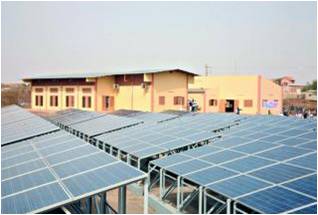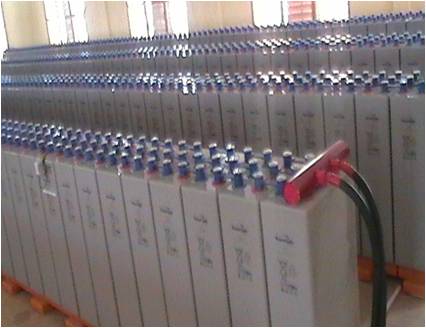Difference between revisions of "First Grid-connected Solar Power Plant in Mali"
***** (***** | *****) m |
***** (***** | *****) m |
||
| (5 intermediate revisions by 3 users not shown) | |||
| Line 1: | Line 1: | ||
| − | |||
| − | + | = Overview = | |
| − | + | '''An example of a successful PPP in Ouéléssébougou/Mali''' | |
| + | [[File:SolarPowerPlant.jpg|frame|right|300px|Grid-connected solar power plant in Mali (216kwc)|alt=Grid-connected solar power plant in Mali (216kwc)]]The 216 kwc [[Portal:Solar|solar power plant]] was inaugurated on Febraury 12, 2011. Attendees were Amadou Toumani Toure, President of Mali, the Minister of Energy, the executive board of the national energy supplier (EDM) and the members of the local council of Ouéléssébougou. | ||
| + | <br/>The community Ouéléssébougou is located around 70 km from the capital Bamako in the Koulikoro region. Energy supply for 500 local families had so far been provided by two diesel generators, which resulted in an exponential increase of operating costs. Thus the Malian bank of commerce (BCI) and the national energy supplier (EDM) launched this pilote project. A battery bank of 300 batteries is supposed to provide a capacitance of 4000 Ah in order to reduce the operating costs by 75%. Estimated investment costs are 1.2 billion FCFA (1.8 million Euros). | ||
| − | + | <br/> | |
| − | + | = Solar Plant Construction = | |
| − | + | ZED sa, long term partner of ELCOM/GIZ was comissioned with the plants‘ construction. Construction took place over a periode of 8 months. The hybrid systems consist of two 220 kw diesel generators, 216 kw solar modules, a 4000 Ah battery bank, 660 kw inverters and a 400 kw transformer. [[File:BatteryBank.jpg|frame|right|300px|Battery Bank|alt=Battery Bank]] | |
| − | [[Category: | + | <br/>According to the mayor of Ouéléssébougou, this solar power plant initiates the social and economic development of the community since electricity can be a promotor for clean drinking water and improved health services. Furthermore he asks the Malian president for a reorientation of the electricity supply to renewable energy in order to provide sustainable use of resources. The head of BCI emphasized the private sector’s willingness and commitment to support such projects. |
| + | |||
| + | <br/>The Malian president pointed out that the inauguration of the solar power plant signalized a new vision of future energy policy. | ||
| + | |||
| + | <br/> | ||
| + | |||
| + | = Further Information<br/> = | ||
| + | |||
| + | *[[Mali Energy Situation|Mali Energy Situation]] | ||
| + | *[[Portal:Solar|Portal:Solar]]<br/> | ||
| + | |||
| + | <br/> | ||
| + | |||
| + | = References<br/> = | ||
| + | |||
| + | <references /> | ||
| + | |||
| + | [[Category:Solar]] | ||
| + | [[Category:Grid]] | ||
| + | [[Category:Mali]] | ||
Latest revision as of 15:24, 28 July 2014
Overview
An example of a successful PPP in Ouéléssébougou/Mali
The 216 kwc solar power plant was inaugurated on Febraury 12, 2011. Attendees were Amadou Toumani Toure, President of Mali, the Minister of Energy, the executive board of the national energy supplier (EDM) and the members of the local council of Ouéléssébougou.
The community Ouéléssébougou is located around 70 km from the capital Bamako in the Koulikoro region. Energy supply for 500 local families had so far been provided by two diesel generators, which resulted in an exponential increase of operating costs. Thus the Malian bank of commerce (BCI) and the national energy supplier (EDM) launched this pilote project. A battery bank of 300 batteries is supposed to provide a capacitance of 4000 Ah in order to reduce the operating costs by 75%. Estimated investment costs are 1.2 billion FCFA (1.8 million Euros).
Solar Plant Construction
ZED sa, long term partner of ELCOM/GIZ was comissioned with the plants‘ construction. Construction took place over a periode of 8 months. The hybrid systems consist of two 220 kw diesel generators, 216 kw solar modules, a 4000 Ah battery bank, 660 kw inverters and a 400 kw transformer.
According to the mayor of Ouéléssébougou, this solar power plant initiates the social and economic development of the community since electricity can be a promotor for clean drinking water and improved health services. Furthermore he asks the Malian president for a reorientation of the electricity supply to renewable energy in order to provide sustainable use of resources. The head of BCI emphasized the private sector’s willingness and commitment to support such projects.
The Malian president pointed out that the inauguration of the solar power plant signalized a new vision of future energy policy.
Further Information





















